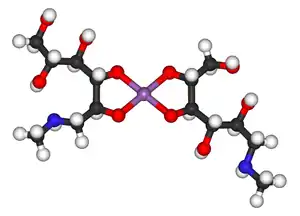Meglumine antimoniate
 | |
| Names | |
|---|---|
| Other names | Meglumine antimonate |
IUPAC name
| |
| Clinical data | |
| WHO AWaRe | UnlinkedWikibase error: ⧼unlinkedwikibase-error-statements-entity-not-set⧽ |
| Defined daily dose | not established[1] |
| External links | |
| AHFS/Drugs.com | Micromedex Detailed Consumer Information |
| Chemical and physical data | |
| Formula | Variable |
| Molar mass | Variable |
| 3D model (JSmol) | |
SMILES
| |
InChI
| |
Meglumine antimoniate is a medicine used to treat leishmaniasis.[2] This includes visceral, mucocutaneous, and cutaneous leishmaniasis.[2] It is given by injection into a muscle or into the area infected.[2]
Side effects include loss of appetite, nausea, abdominal pain, cough, feeling tired, muscle pain, irregular heartbeat, and kidney problems.[2] It should not be used in people with significant heart, liver, or kidney problems.[2] It is not recommended during breastfeeding.[2] It belongs to a group of medications known as the pentavalent antimonials.[2]
Meglumine antimoniate came into medical use in 1946.[3] It is on the World Health Organization's List of Essential Medicines.[4] The wholesale cost in the developing world is about 4.32 USD per vial as of 2014.[5] It is available in Southern Europe and Latin America but not the United States.[6][7]
Medical uses
Dosage
The defined daily dose is not established.[1]
Society and culture
It is manufactured by Aventis[8] and sold as Glucantime in France, and Glucantim in Italy.
See also
References
- 1 2 "WHOCC - ATC/DDD Index". www.whocc.no. Archived from the original on 1 July 2021. Retrieved 21 September 2020.
- 1 2 3 4 5 6 7 World Health Organization (2009). Stuart MC, Kouimtzi M, Hill SR (eds.). WHO Model Formulary 2008. World Health Organization. p. 183. hdl:10665/44053. ISBN 9789241547659.
- ↑ Sneader, Walter (2005). Drug Discovery: A History. John Wiley & Sons. p. 59. ISBN 9780470015520. Archived from the original on 2016-12-20.
- ↑ World Health Organization (2019). World Health Organization model list of essential medicines: 21st list 2019. Geneva: World Health Organization. hdl:10665/325771. WHO/MVP/EMP/IAU/2019.06. License: CC BY-NC-SA 3.0 IGO.
- ↑ "Meglumine Antimonate". International Drug Price Indicator Guide. Archived from the original on 22 January 2018. Retrieved 8 December 2016.
- ↑ Bope, Edward T.; Kellerman, Rick D.; Rakel, Robert E. (2010). Conn's Current Therapy 2011: Expert Consult. Elsevier Health Sciences. p. 95. ISBN 143773572X. Archived from the original on 2016-12-20.
- ↑ Gorbach, Sherwood L.; Bartlett, John G.; Blacklow, Neil R. (2004). Infectious Diseases. Lippincott Williams & Wilkins. p. 355. ISBN 9780781733717. Archived from the original on 2016-12-20.
- ↑ Aventis press release Archived 2014-05-22 at the Wayback Machine, 15 April 2005. (in German)
External links
| Identifiers: |
|
|---|
- "Meglumine antimoniate". Drug Information Portal. U.S. National Library of Medicine. Archived from the original on 2021-08-28. Retrieved 2020-05-18.